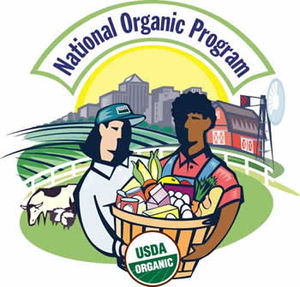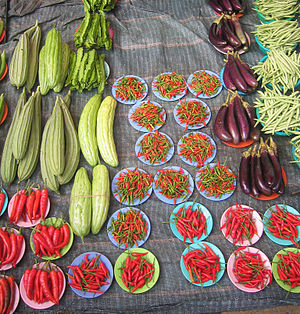 |
| The National Organic Program administers the Organic Seal to products that meet the requirements. (Photo credit: Wikipedia) |
In 1933, Lord Northbourne published a book titled 'Look to the Land,' in which he outlined certain methods of food production he termed 'Organic.' His goal was to establish a view of the farm as an organism, self-contained and self-sustaining, in opposition to what he termed unsustainable 'chemical farming' relying on fertilizers and chemical pesticides. In large part, this organic farming was not a particular change from traditional farming techniques at the time.
In the mid-20th century, the 'Green Revolution' led to widespread methods of chemical and industrialized farming that is still used today. As a reaction to the perceived weaknesses of these modern farming techniques, organic farming has grown in popularity in recent decades and particularly in the last ten years.
What is Organic
Briefly, organic food is that which is farmed using organic farming methods. This means excluding food additives and genetically modified ingredients and avoiding the use of inorganic farming techniques such as chemical pesticides or crop irradiation. The exact definition of organic food can vary - according to the FDA, food is considered Organic if it consists of 95% or more organic ingredients. Other markets may have greater or fewer restrictions, depending on the criteria of various government agencies and the terms they set.
Know Your Food
Prior to the modern boom in organic popularity, the only way to be certain a product was organic was direct observation. Organically minded consumers would visit local farms and buy directly from farmers they knew to rely on organic techniques. They could observe firsthand the way produce was grown or the techniques used to milk cows. They could discuss changes and conditions with their provider, and generally the motto of the day was "Know your farmer, know your food."
This changed with the rapid increase in demand for organic food in recent years - as entire organic supermarkets such as Whole Foods came into being, consumption moved into the mainstream. Not everyone in the suburbs or major urban centers of the world is equipped with the knowledge or the time to get to know their individual local farmers, and sometimes organic produce can travel a great distance between production and distribution. Thus, third party agencies and government organizations have stepped in to create labels that certify products as organic in accordance with various private and public standards.
 |
| English: Organic vegetables at a farmers' market in Argentina. (Photo credit: Wikipedia) |
Concerned consumers are therefore advised to research the standards set down by the certifying groups, and to do a little online research into how they go about making their decisions. Again, for example, the US certifies any product with at least 95% organic 'ingredients' as organic. This may mean that the end product itself was not prepared in accordance with organic procedures, or is packaged in an inorganic container. A little research can help allay or confirm suspicions and concerns such as these, so the educated consumer becomes the happy consumer.
Why Buy Organic
There are as many reasons for buying organic as there are products to buy. One of the most cited reasons is improved taste and food quality over industrially farmed food. Blind taste tests comparing conventionally and organically farmed apples indicated organic apples were usually sweeter and firmer than their competition. Proponents claim the lack of additives allows the natural, complex flavors of the food to come out and really captivate the consumer.
 |
| Organic Soft Gingerbread Cookies (Photo credit: Growing a Green Family) |
The lack of pesticides also creates an environmental benefit important to many organically minded consumers. Pesticides can and do run into the local ecosystem surrounding any farming endeavor, and can cause havoc that may take generations to uncover and even longer to repair. Organic farming offers less impact on the ecology of the community and allows for a sense of civic responsibility and pride in participants.
A Little More Money
That said, organic farming does come with a hefty price tag. Since the same amount of land is producing less than conventionally farmed land, organic produce and goods can cost as much as 40% more than the alternative. A half-gallon of organic milk can cost as much as a full gallon of conventionally produced milk, which affects consumers' bottom line. Fortunately, there are ways to reduce this cost, again with a little bit of research.
 |
| English: Organic apple orchard in Pateros, Washington, USA (Photo credit: Wikipedia) |
As with any passion, the key to truly getting the best use out of organic products comes from information, consideration, and action.
About the Author:
Janet Davis and her husband are health and nutrition entrepreneurs and founders of Mark And Janet, a website with uncompromising, premium products for your health conscious family. For more on going green -- Visit us at http://www.MarkandJanet.com/ or check out our blog at http://www.MarkandJanetBlog.com/
Read More Articles by Janet Davis
Source: thePhantomWriters.com Article Submission Service







